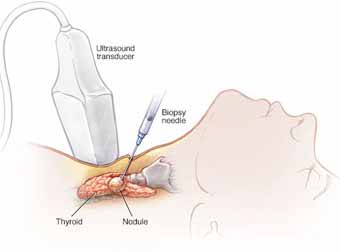Thyroid Cancer Treatment
Your thyroid cancer treatment options depend on the type and stage of your thyroid cancer, your overall health, and your preferences.
Treatment may not be needed right away
Very small thyroid cancers that have a low risk of spreading in the body might not need treatment right away. Instead, you might consider active surveillance with frequent monitoring of the cancer. Your doctor might recommend blood tests and an ultrasound exam of your neck once or twice per year.
In some people, the cancer might never grow and never require treatment. In others, growth may eventually be detected and treatment can be initiated.
Diagnosis
- Physical exam. Your doctor will examine your neck to feel for physical changes in your thyroid, such as thyroid nodules. He or she may also ask about your risk factors, such as past exposure to radiation and a family history of thyroid tumors.
- Blood tests. Blood tests help determine if the thyroid gland is functioning normally.
- Ultrasound imaging. Ultrasound uses high-frequency sound waves to create pictures of body structures. To create an image of the thyroid, the ultrasound transducer is placed on your lower neck. The appearance of your thyroid on the ultrasound helps your doctor determine whether a thyroid nodule is likely to be noncancerous (benign) or whether there's a risk that it might be cancerous.
- Removing a sample of thyroid tissue. During a fine-needle aspiration biopsy, your doctor inserts a long, thin needle through your skin and into the thyroid nodule. Ultrasound imaging is typically used to precisely guide the needle into the nodule. Your doctor uses the needle to remove samples of suspicious thyroid tissue. The sample is analyzed in the laboratory to look for cancer cells.
- Other imaging tests. You may have one or more imaging tests to help your doctor determine whether your cancer has spread beyond the thyroid. Imaging tests may include CT, MRI and nuclear imaging tests that use a radioactive form of iodine.
- Genetic testing. Some people with medullary thyroid cancer may have genetic changes that can be associated with other endocrine cancers. Your family history may prompt your doctor to recommend genetic testing to look for genes that increase your risk of cancer.


